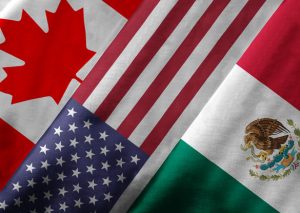NAFTA — Now USMCA — Agreed to at Last
You have to ask, after all the damage that America’s threats to rip up the North American Free Trade Agreement (NAFTA) has done to the relationship between the three member countries, whether the eventual outcome this week was worth it.
Need buying strategies for steel? Request your two-month free trial of MetalMiner’s Outlook
Naturally enough, politicians, being politicians, are all hailing the resulting deal as win for all concerned. To ring the changes, they have even come up with a snappy new name: the United States-Mexico Canada Agreement (USMCA), which must have taken all of 10 minutes to concoct.
To come into effect, the USMCA must be ratified by each country’s Congress, which will prove tricky as a new administration takes over in Mexico Dec. 1 and the Republican-controlled Congress is facing mid-term elections next month – hence the Washington-enforced deadline of end September for a deal (otherwise, the U.S. and Mexico threatened to go it alone on their bilateral terms agreed in August).
So, what have the threats, taunts and accusations of the last few months achieved?
Well, to draw on an article in The New York Times, three specific changes from the old NAFTA have been agreed upon.
■ International settlement dispute hasn’t changed. A system that allows the three countries to rely on an independent body to resolve disputes will remain intact. Despite strong opposition from the U.S., Canada has succeeded in keeping this provision, known as Chapter 19.
■ Dairy. The U.S. will be allowed to increase dairy exports into Canada, a win for President Trump, who had insisted on greater access for U.S. dairy farmers.
Canada, somewhat like France, has always held an outsized place for farming in its national psyche and operated a complex system of production quotas and import tariffs designed to ensure Canadian dairy, egg and poultry farmers receive fair prices for their products. While the entire trade in dairy products between the two countries is tiny — worth less than U.S. $600 million, according to a recent report by The Guardian, it has been a bugbear to Trump, arguably out of all proportion to its economic significance.
■ Autos. This is without doubt the biggest and most important concession.
The new agreement will require a higher percentage of a car to be manufactured in North America to qualify for zero tariffs. If Canada mirrors Mexico, as seems probable, the percentage must increase from 62.5% to 75%. In addition, for the first time the deal requires that a percentage of any vehicle that qualifies for zero tariffs must be manufactured in a factory where the average production wage is at least $16 an hour, a figure comfortably exceeded in the U.S. and Canada but which will present challenges and have consequences for vehicle production in Mexico.
■ Tariffs. Much to Canada’s chagrin, steel and aluminum tariffs will, for the time being, remain in place for material imported into the U.S. from Canada and Mexico, pending further negotiations. However, Canada and Mexico have secured at least a partial exemption from any potential future U.S. tariffs on automobiles.
As The Economist observes, the USMCA contains hundreds of pages of legalese. Companies will need time to work out how to comply with the new rules. There could yet be much devil in the detail, with one section addressing the consequences of one of the parties starting trade negotiations with a “non-market country” (code for China, The Economist suggests), marking cause for expulsion from the whole agreement.
But businesses on both sides of the U.S.-Canada border are on the whole hugely relieved the uncertainty over the changes are not as significant as had been feared.
For more efficient carbon steel buying strategies, take a free trial of MetalMiner’s Monthly Outlook!
Assuming ratification is successful, supply chains on both sides of the border can look forward to 2019 with more confidence than they had over the last few months.



Leave a Reply